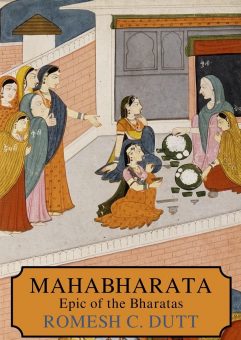Happy too is faithful Madri, for she trod the virtuous way,
Followed Pandu to the bright sky, and is now his joy and stay,
[250] Ye alone are left to Pritha, dear unto her joyless heart,
Mother’s hope and widow’s treasure, and ye may not, shall not part,
Leave me not alone on wide earth, loving sons, your virtues prove,
Dear Draupadi, loving daughter, let a mother’s tear-drops move,
Grant me mercy, kind Creator, and my days in mercy close,
End my sorrows, kind Vidhata, end my life with all my woes!
Help me, pious-hearted Krishna, friend of friendless, wipe my pain,
All who suffer pray unto thee and they never pray in vain,
Help me, Bhishma, warlike Drona, Kripa ever good and wise,
Ye are friends of truth and virtue, righteous truth ye ever prize,
Help me from thy starry mansions, husband, wherefore dost thou wait,
Seest thou not thy godlike children exiled by a bitter fate!
Part not, leave me not, my children, seek ye not the trackless way,
Stay but one, if one child only, as your mother’s hope and stay,
Youngest, gentlest Sahadeva, dearest to this widowed heart,
Wilt thou watch beside thy mother, while thy cruel brothers part?”
Whispering words of consolation, Pritha’s children wiped her tear,
Then unto the pathless jungle turned their footsteps lone and drear!
Kuru dames with fainting Pritha to Vidura’s palace hie,
Kuru queens for weeping Pritha raise their voice in answering cry,
Kuru maids for fair Draupadi fortune’s fitful will upbraid,
And their tear-dewed lotus-faces with their streaming fingers shade,
Dhrita-rashtra, ancient monarch, is by sad misgivings pained,
Questions oft with anxious bosom what the cruel fates ordained.
Book V. Pativrata-Mahatmya (Woman’s Love)
[251] True to their word the sons of Pandu went with Draupadi to exile, and passed twelve years in the wilderness; and many were the incidents which checkered their forest life. Krishna, who had stood by Yudhishthir in his prosperity, now came to visit him in his adversity; he consoled Draupadi in her distress, and gave good advice to the brothers. Draupadi with a woman’s pride and anger still thought of her wrongs and insults, and urged Yudhishthir to disregard the conditions of exile and recover his kingdom. Bhima too was of the same mind, but Yudhishthir would not be moved from his plighted word.
The great rishi Vyasa came to visit Yudhishthir, and advised Arjun, great archer as he was, to acquire celestial arms by penance and worship. Arjun followed the advice, met the god Siva in the guise of a hunter, pleased him by his prowess in combat, and obtained his blessings and the pasupata weapon. Arjun then went to INDRA’S heaven and obtained other celestial arms.
In the meanwhile Duryodhan, not content with sending his cousins to exile, wished to humiliate them still more by appearing before them in all his regal power and splendour. Matters however turned out differently from what he expected, and he became involved in a quarrel with some gandharvas, a class of aerial beings. Duryodhan was taken captive by them, and it was the Pandav brothers who released him from his captivity, and allowed him to return to his kingdom in peace. This act of generosity rankled in His bosom and deepened his hatred.
Jayadratha, king of the Sindhu or Indus country, and a friend [252] and ally of Duryodhan, came to the woods, and in the absence of the Pandav brothers carried off Draupadi. The Pandavs howeyer pursued the king, chastised him for his misconduct, and rescued Draupadi.
Still more interesting than these various incidents are the tales and legends with which this book is replete. Great saints came to see Yudhishthir in his exile, and narrated to him legends of ancient times and of former kings. One of these beautiful episodes, the tale of Nala and Damayanti, has been translated into graceful English verse by Dean Milman, and is known to many English readers. The legend of Agastya who drained the ocean dry; of Parasu-Rama a Brahman who killed the Kshatriyas of the earth; of Bhagiratha who brought down the Ganges from the skies to the earth; of Manu and the universal deluge; of Vishnu and various other gods; of Rama and his deeds which form the subject of the Epic Ramayana these and various other legends have been interwoven in the account of the forest-life of the Pandavs, and make it a veritable storehouse of ancient Hindu tales and traditions.
Pages: 1 2 3 4 5 6 7 8 9 10 11 12 13 14 15 16 17 18 19 20 21 22 23 24 25 26 27 28 29 30 31 32 33 34 35 36 37 38 39 40 41 42 43 44 45 46 47 48 49 50 51 52 53 54 55 56 57 58 59 60 61 62 63 64 65 66 67 68 69 70 71 72 73 74 75 76 77 78 79 80 81




